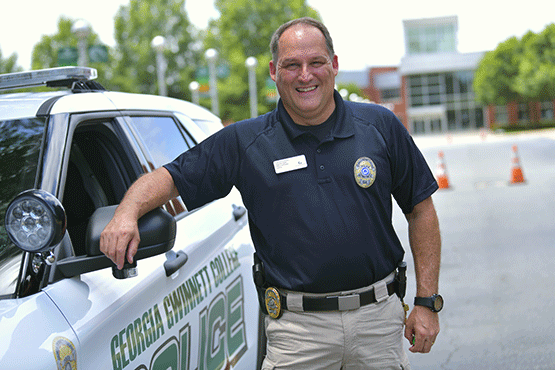news
National Campus Safety Awareness Month: Georgia Gwinnett College assistant police chief promotes service, empathy, respect

Carlos Llorens has a servant’s heart. He has spent more than 33 years serving his fellow countrymen in uniform, enlisting in the U.S. Marine Corps in 1986 straight out of high school, where he served for seven years in the reserves as a computer programmer before becoming a police officer for Gwinnett County, a job he did for 16 years before coming to Georgia Gwinnett College (GGC) in 2010. Today, as the nation celebrates National Campus Safety Awareness Month, Llorens is Georgia Gwinnett College’s deputy police chief, responsible for all the daily operations of the college’s police department (GGCPD).
Llorens grew up in many places around the country, one of seven kids and a first-generation American. His father, Rodrigo, immigrated from Peru in 1954 and learned to speak English while working as a bus boy in the hotel industry, eventually working his way up to become an executive at Marriott Corporation.
“Being the son of an immigrant, I see the world through different eyes,” said Llorens. “It gives me a unique perspective, and an empathy that helps me be a better officer. I know that sometimes it’s hard for people to reach out and connect, but for me, my wife and kids will tell you, I’ve never met stranger, I couldn’t talk to. I would talk to a wall.”
Llorens uses that natural affinity for people to build personal relationships in the communities he serves, which he says is key to being a good police officer.
“If you’re going to be in this kind of work, you have to enjoy being the person who can help somebody even if it’s not your job,” he said. “There’s a difference between trying to be a community police officer, and being part of the community.”
To that end, Llorens focuses on the bedrock of the GGC community; its students.
“Our students are why we’re all here. If we didn’t have students, we wouldn’t have jobs,” he said. “While we do serve faculty and staff, I think we really owe it to the students, when they have a question or concern, or just a curiosity about our jobs, to give them our time. I have students ask to speak with me on a regular basis. If I can sit down and talk with them, I make time. I get here early in the morning, usually before 7, and I usually leave after 5. It gives a big window for people to come see me and I rarely turn anyone down, even without an appointment. I really feel like in order to police in this environment, in this community with nearly 14,000 of us on campus, we have to have that accessibility where people feel comfortable.”
Llorens and his team of 26 officers answered 22,000 calls last year on campus, mostly for things like auto accidents, thefts or lost and mislaid property. They also spend a lot of time aiding people in need, by providing jumps for dead car batteries, helping with flat tires etc. His officers are able to resolve the vast majority of cases without having to arrest or ticket those involved.
“The nice thing is we have tools in our toolbox that most don’t have,” he said. “We are a community that’s more like a family. We can count on student integrity so that we don’t have to write a citation or move it further. We act with a level of respect that we hope to receive back. That ability to talk to people really helps in that because most people rarely or never interact with the police.”
Llorens also stresses education as an integral part of police work, and proudly points out that every officer on the GGCPD is currently in the process of earning a bachelor’s or master’s degree.
“I’m currently working on my masters and I harp and bug and push every officer here to continue their education because I think the more educated we are, the more we can communicate,” he said.
Regarding the recent state of unrest that has gripped the country, Llorens hopes people know that police officers are like anyone else in society.
“We’re just like you,” he said. “I’m a dad with two kids. Everybody in our department has families. We are as normal as everybody else; we’ve just chosen to serve in a different way.”
